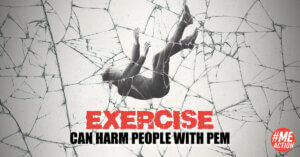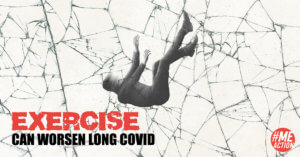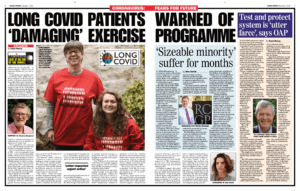
NIH Must Not Overlook Evidence of Exercise Harm
Long COVID Exercise study must address safety, efficacy concerns.

Long COVID Exercise study must address safety, efficacy concerns.

Calls for immediate public release of RECOVER’s clinical trial design

In response to an article on Long Covid last week, the Guardian published a letter from three men – Dr Alistair Miller, Professor Paul Garner and Professor Peter White. This letter spread false information about the efficacy and safety of graded exercise therapy for ME and Long Covid. We are pleased to see that The

#MEAction UK has just received a momentous email from the National Institute for Health and Care Excellence (NICE), advising us that they have updated the warning on the 2007 CFS/ME guideline, directing health professionals to the new draft recommendations on graded exercise therapy.

There were significant concerns about the recommendation of a physical activity programme in the draft ME/CFS guideline, even with the caveats attached. The recommendation that a physical activity programme should be considered if patients would ‘like’ to start one, was felt to imply that there is a choice or a desire involved, rather than increased physical activity being impossible for many.

#MEAction UK is highlighting the links between “Long Covid” and ME in the press. In particular, we want people at risk to know about the danger of exercise if they have post-exertional malaise.

#MEAction UK has sent an open letter to Matt Hancock asking him to recognise the harm caused by graded exercise therapy. We are calling on him to ensure all advice for people with ME, and those at risk of developing ME post-COVID, warns of the harm from graded exercise therapy. Join us by asking your MP to write to Matt Hancock too and telling them about your experience of ME.

The National Institute for Health and Care Excellence (NICE) have released a document entitled “interim findings”, stating that the recommendation of graded exercise therapy for mild and moderate ME/CFS should not apply to people with fatigue following COVID-19. They note that the existing guideline was published in 2007, many years before the pandemic, and that they are aware of concerns around graded exercise therapy.

Listen to the article: Exercise protocols prescribed for myalgic encephalomyelitis (ME) were powerful enough for Cherry to ignore the physiological realities of her disease. Cherry is now 100 percent bedridden. When 16-year-old Cherry from North London began the treatment prescribed for her myalgic encephalomyelitis (ME) in 2013, she was able to walk to her local
It appears that Cochrane will NOT temporarily remove a review from its database that claims exercise therapy is effective for chronic fatigue syndrome (CFS) and myalgic encephalomyelitis (ME), as a report in Reuters had indicated last week. Instead, Cochrane editors have added an editor’s note (that is all but invisible unless you really go searching for it)